An Interview with Yang Yong-hi
by Adam Hartzell
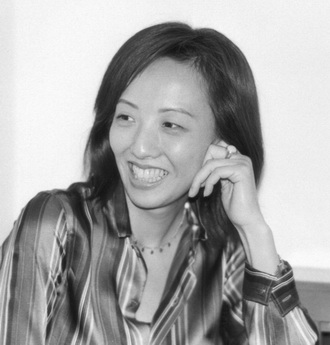
Director Yang Yong-hi is still embarrassed that Dear Pyongyang (2005) begins with "only letters, sentences," much too many in her opinion. Although she makes films for herself, she realized she had to think about the likely limited historical knowledge of her audience. Japanese viewers would know about Zainichi Koreans, but international audiences wouldn't. And even the Japanese audience wouldn't be that familiar with "The Repatriation Project". (When I spoke with Yang in English, not her first language, she referenced the historical moment as "The Return Project". Scholars, such as John Lie and Shota Tsai Ogawa, refer to it as "The Repatriation Project". I will follow the tradition of most scholarship and refer to the moment as "The Repatriation Project".) Since not many movies have been written about the history of Zainichi Koreans, Yang was left having to find the best way to provide the necessary context about why her brothers ended up in North Korea while she and her parents live in Japan. Text rather than images seemed the most efficient way to convey all the necessary context. Ironically, Shota Tsai Ogawa interprets the beginning text as a "decision to compress the historical overview into a few title cards", seeing this as evidence that "Yang appears reluctant to expand on the complex geopolitical factors that informed the repatriation project". Where Yang sees too much text, Ogawa sees too little. "I really didn't want to put any sentences", said Yang. "If we could suddenly start, that would be great, but it's impossible."
Now, like Yang, I have to provide context about Zainichi Koreans and The Repatriation Project because it's impossible to go any further and do justice to, as Ogawa notes, the geopolitical complexity without my own copious sentences.
'Zainichi' literally means 'staying/existing in Japan.' So 'Zainichi Koreans' means Koreans living within Japan. Technically there could be other Zainichi, such as Zainichi Chinese or Zainichi Iranians. But when a Japanese says 'Zainichi', they are referring to Koreans living in Japan. Scholarly literature also refers to this community as simply Zainichi, so I will continue that practice here.
Presently, roughly 900,000 Zainichi live in Japan. How did they get there? Well, when Japan colonized Korea (it was a single undivided nation at this time), some Koreans sought opportunities in the more 'Modern' Japan. But many more Koreans were also forced to migrate to Japan. Some were drafted into the Japanese military, some were made to work in factories, and some were enslaved in brothels. Japanese colonization of Korea lasted from 1910-1945, long enough for a generation of Zainichi to be born and raised in Japan, primarily speaking Japanese and observing Japanese customs. After the war ended, many Zainichi migrated back to Korea, but others stayed rooted in what had become their home. Things became more complicated during the Korean War and when one Korean became two with the eventual armistice agreement that ended direct conflict. (North Korea and South Korea are technically still at war since no peace treaty was signed.) Both Koreas were war town countries, neither an inviting place, motivating many Zainichi to stay put in Japan.
Although many could 'pass' as Japanese, Japan was not the most welcoming place for Zainichi. Zainichi were not seen as full Japanese nationals in Japan. Eventually three avenues emerged for Zainichi status. One could naturalize as a Japanese citizen or one could be a resident of Japan with North Korean or South Korean passports. Even though roughly 90% of Zainichi trace their ancestry back to what is now South Korea, (Jeju Island comes up often in the research I have read, which is the ancestral home of director Yang's father), for the first two decades or so following the war, South Korea was nothing like the Gangnam glamour we now see K-Pop-ing before us on YouTube. It was an impoverished country run by dictators Syngman Rhee and later Park Chung-hee. North Korea was run by a dictator too, and always has been, but communism preached a false hope to many oppressed peoples in the 1940s and 1950s and since North Korea was a more prosperous country than South Korea during those decades, most Zainichi chose North Korean passports. Besides what their passports said, Zainichi affiliated with either the group Soren (North Korea) or Mindan (South Korea) in Japan. (These are shorthand labels for the official names of the groups that most scholars use as well. You will occasionally see folks use 'Chongryon' or 'Jochongryeon', short-hand used by Koreans for "Jae-ilbon Joseon Chongryeon Haphoe", instead of Soren.)
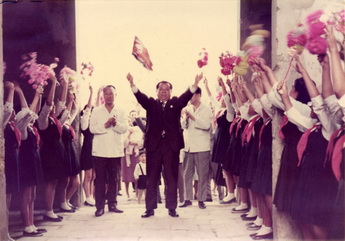 It is through Soren that The Repatriation Project was promoted. From the late 1950s to the 1970s more than 90,000 Zainichi repatriated to North Korea. Director Yang's three older brothers were a part of the later stages of this project. In 1971, they were sent as "human gifts to Kim Il-sung", (to use Yang's words during our interview), when Yang was only 6 years old. As Ogawa argues, by the time Yang's brothers were repatriated to North Korea, many Zainichi were finding out about the poverty and discrimination Zainichi would face in North Korea. It is true that Yang does not directly mention this shift in Zainichi awareness in the text that begins her documentary. But Yang did provide this context in the talk I attended at UC Berkeley where her feature debut, Our Homeland (2012), was screened. For example, she talked about how if you said you were going to North Korea as part of The Repatriation Project, you'd be treated as a hero. "But when that announcement became real, they were, like, 'Uh-oh'", knowing the reality of North Korea was nothing like the fantasy portrayed in Soren meetings.
It is through Soren that The Repatriation Project was promoted. From the late 1950s to the 1970s more than 90,000 Zainichi repatriated to North Korea. Director Yang's three older brothers were a part of the later stages of this project. In 1971, they were sent as "human gifts to Kim Il-sung", (to use Yang's words during our interview), when Yang was only 6 years old. As Ogawa argues, by the time Yang's brothers were repatriated to North Korea, many Zainichi were finding out about the poverty and discrimination Zainichi would face in North Korea. It is true that Yang does not directly mention this shift in Zainichi awareness in the text that begins her documentary. But Yang did provide this context in the talk I attended at UC Berkeley where her feature debut, Our Homeland (2012), was screened. For example, she talked about how if you said you were going to North Korea as part of The Repatriation Project, you'd be treated as a hero. "But when that announcement became real, they were, like, 'Uh-oh'", knowing the reality of North Korea was nothing like the fantasy portrayed in Soren meetings.
After reading these three paragraphs, you may well prefer the few minutes of text opening Dear Pyongyang that explains how Yang's brothers ended up in North Korea.
People continue to ask Yang about her background and her family. If her family had been one of the few initially affiliating with South Korea, perhaps her history would not require so much explanation. "I really wanted to be a futsuno, normal, Zainichi, only have connection with the South. So much easier, right? But with the North, everything became difficult, many explanations." But, for now, when someone is confused by her name, confused by a 'Korean' speaking perfect Japanese, or when 'Zainichi' has to be explained to someone she just met at a bar, she refers them to Dear Pyongyang. She also has written non-fiction books and a novel. "When I was asked, 'Hey, do you have siblings?! Where are they?!' It was like, from where do I need to explain? From the colony times? [Laughs.] Do I really have to explain about it? I can't just simply talk about my family. My life is always - asked, asked, asked; means always - explained, explained, explained." Inquisitive random Japanese strangers are now basically assigned a syllabus by Yang of her films and books rather than intimately rehashing her history as Zainichi at the bar. It is now up to the questioner to take responsibility to educate themselves.
Yang's life in film began as something treasured by her brothers. Her oldest brother had told her often when she was very young, 'Hey, Yong-hi, watching great films makes you smart. Listening to good music gives you a beautiful mind.' She watched many films in her youth, almost a daily activity for her, focusing on US and European films ("Tarkovsky!"). At the end of her 20s, her interests focused on stage theater and fiction. She went to the Korea University in Tokyo and studied Korean literature, which really meant she was trained to be a teacher. She would have preferred to go to a Japanese university but her Korean school education hadn't properly prepared her for the exams to get into a Japanese university. Still, being in Tokyo enabled her an opportunity to see a lot of plays, and not just those performed by Zainichi companies, many from Japanese production companies as well.
Yang started a theater company with other Zainichi in Tokyo when she graduated and began working as a teacher in a Korean school. This theater company was called 'Pa-ran-se' or 'Bluebird' in Korean. Yang eventually left this company when she found herself at odds with the members because she wanted to be inclusive and have a mixed Japanese/Zainichi company.
The next act in her life arose while hanging out at bars, parties, and Izakayas in Tokyo, where Yang would call for inclusion in the other direction. These public/private venues were where many Japanese, through the social lubricant of alcohol, asked her about being Zainichi. Some of these fellow patrons became friends. And some of these friends were journalists. One day Yang decided to call out the problematic approaches of these Japanese journalists. "'When you guys make a TV documentary, why don't you work with the Zainichi people together as a staff member? Always only Japanese people. That's why the programs are so boring.' [Laughs.]" Rather than feel attacked, these journalist friends listened and encouraged Yang to take on the task of preparing a documentary herself. They advised her to purchase a Hi-8 video camera since they recently came on the market and were a relatively affordable way to begin making films.
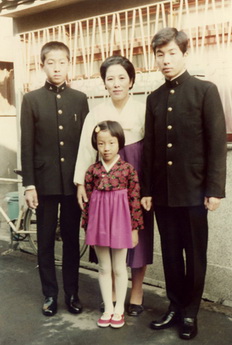 Yang proceeded to take their advice seriously. She interviewed several Zainichi women about the Korean national costume, the hanbok. Wearing a hanbok for Zianichi women is a sartorial signifier of 'coming out' as Zianichi to neighbors, co-workers, and friends who might not be clued into their heritage. She presented this first effort at a documentary to NHK, Japan's national public broadcaster. "NHK really loved it. So it was my first, first, first work with a video camera. It was aired by NHK, means, why don't I continue to do that."
Yang proceeded to take their advice seriously. She interviewed several Zainichi women about the Korean national costume, the hanbok. Wearing a hanbok for Zianichi women is a sartorial signifier of 'coming out' as Zianichi to neighbors, co-workers, and friends who might not be clued into their heritage. She presented this first effort at a documentary to NHK, Japan's national public broadcaster. "NHK really loved it. So it was my first, first, first work with a video camera. It was aired by NHK, means, why don't I continue to do that."
Simultaneously at this time, a radio program was looking for hosts who were multi-lingual. Speaking Japanese and Korean, Yang pursued this opportunity as well, shifting her focus from 'fiction' (plays, novels) to non-fiction. She traveled throughout Asia, but here is where her Zianichi status presented some obstacles. She couldn't go to South Korea because her passport was North Korean. And going to North Korea involved some serious finagling as well. As a result, the radio program sent her throughout other parts of Asia.
This growing interest in the documentary form led her to another major influence in her life, the Yamagata International Documentary Film Festival. "I was so surprised because documentary sounded like boring, difficult, dark, heavy, you know, too serious. At Yamagata, I stayed 7 days, from the morning until the late night, I watched, watched, watched the documentary, I was totally, 'Wow, documentary not only serious and heavy and difficult and boring' right? Documentary is also very interesting and sexy and also funny. And so many good documentaries abroad. I was really attracted by some documentaries [that] portrayed [their] own families."
And so began Yang's venture into documenting her family, what would become two documentary films, Dear Pyongyang and Sona, The Other Myself (2010). For 10 years, she would film her family in Osaka, Japan and Pyongyang, North Korea. But in between filming in those locations and attending the Yamagata Documentary Film Festival every 2 years, she also spent time in the US, in New York City. "I realized I really need[ed] to study . . . journalism and film." Living in the US would help her improve her English, but she also wanted to look at Japanese society in general, and Zainichi society in particular, from an outsider's perspective.
While in New York, a friend encouraged her to check out a documentary film class at The New School in New York. This class, most likely 'Documentary: Its Art, History and Future', was a revelation for Yang. She went straight up to the professor at the end of the class and asked her if she could take the class even if she wasn't enrolled. That professor was Dierdre Boyle. As Yang recalls, Boyle told her upfront that she couldn't take the class unless she was enrolled. This motivated Yang to study TOEFL (Test of English as a Foreign Language) for one year and then officially enroll in The New School. When I asked Boyle over email about this first meeting, she wrote "I vaguely recall coming up to me after class and enthusiastically saying she wanted to come to New York and study with me. I was a bit surprised and very flattered. But I didn't think it would happen. I confess at that point I didn't know her nor how significant that encounter would be for us both." Boyle would soon become an important mentor for Yang. Each time Yang brought up Boyle in our conversation, it was with the enthusiastic, animated energy one reserves for a good friend. "She's great. She's still my big sister. I talk to her [about] everything, even love relationships." Yang gives a great deal of credit to the discussions in Boyle's classes. "Discussion in Deirdre's class really, really helped me. And, also, during the stay in New York, I really seriously, seriously think about making a documentary about my family." And eventually, Yang realized "that my father should be the main character."
Compiling a documentary about one's family is vulnerable enough, but considering the political marginality of her Zainichi family, considering that she might put her family in North Korea at risk if anything she said upset North Korean authorities, Yang had greater concerns than most directors. "Isn't it harmful to my brothers and also my parents?" This hesitation was another area where Yang found wise counsel from Boyle. "She never said, 'You should do that! You have to do that!' She was like, 'You should film them as much as you could. And, finally, if it's dangerous for them, or, finally, if you don't want to make a film, you can quit. You can stop anytime. But for documentary, you cannot [go] back to the past.'"
Boyle elaborated further on the guidance of filming ones family, and one that is associated with such a precarious political regimen.
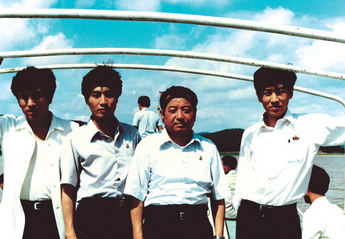 "Because Yong-hi was going to be tackling difficult subject matter about her family, I urged her to be very aware that the ethical and emotional complexities when dealing with one's family were greater than for work with any other subject. Given the political context of making work about her family in North Korea, I sympathized with her fears over the effect this might have for her family there and in Japan. I thought that given her love and concern for all of them, she would make good decisions that would honor them and not put them at risk. I urged her to trust herself and go forward. I know I told her she would make a great film because I had complete faith in her. Talent wasn't the doubt, it was how hard this would be emotionally. After the release of Dear Pyongyang, Yong-hi was forbidden to return and visit her family again. She knew this was a possibility as did they, but she went ahead because of her committment to the truth of their lives. And we both knew that this was going to be very, very hard."
"Because Yong-hi was going to be tackling difficult subject matter about her family, I urged her to be very aware that the ethical and emotional complexities when dealing with one's family were greater than for work with any other subject. Given the political context of making work about her family in North Korea, I sympathized with her fears over the effect this might have for her family there and in Japan. I thought that given her love and concern for all of them, she would make good decisions that would honor them and not put them at risk. I urged her to trust herself and go forward. I know I told her she would make a great film because I had complete faith in her. Talent wasn't the doubt, it was how hard this would be emotionally. After the release of Dear Pyongyang, Yong-hi was forbidden to return and visit her family again. She knew this was a possibility as did they, but she went ahead because of her committment to the truth of their lives. And we both knew that this was going to be very, very hard."
Boyle considers this difficult debut work to truly be Yang's "masterpiece".
One tactic Yang realized could protect her brothers was to focus
Of all the documentaries made about life in North Korea, Yang does have the unique perspective having family members living in North Korea affords. She could stay in the apartment of her family members rather than tourist hotels. Yang said that her family members were more reserved when the video camera was on, but they revealed more of themselves when she put it down. They talked more. And when they got drunk, they talked more and more. This is a reminder that the non-diegetic space we don't witness might reveal more than the diegetic space of the screen. Yang loves her family, so she had to protect them. Yang wanted to know about her brothers' real lives, but to get closer to knowing them, she had to shut off the camera. To get closer to knowing her brothers better, Yang had to keep the audience from seeing them. At the same time, as Boyle notes, "It shows the power of personal filmmaking--low tech, portable 'home video' equipment gave her unobstructed access to filming her family, and this amateur technology was like a Trojan Horse, allowing her in and out of the country without surveillance so that she could relay what life was like there."
The release of Dear Pyongyang resulted in Yang being banned from North Korea. Back at home in Japan, Soren representatives demanded Yang write an apology for offending North Korea. She didn't write that apology. Instead, she made another film, Sona, The Other Myself, Sona being Yang's niece. Although I have not had a chance to watch this documentary, Boyle wrote "Sona, the Other Myself is a sequel and in many ways the most poignant work for her since she knew while editing it that she would not be able to continue to visit her brothers and her niece, who was an alter ego for her."
The casting of Ando and Arata were partly responsible for the success of the film. A lot of Japanese who knew little about Zainichi and even less about The Repatriation Project were finally exposed to this history. Repeat visits to watch the film were common. Fashion magazines extended this history lesson through photospreads featuring the cast. The Japanese cast in the film told Yang they wanted to see more Zainichi stories on screen.
And that is what Yang herself is hoping for, very much wanting to direct a film about The Repatriation Project. But to make this film, she might have to go beyond Indie. She might need to convince a mainstream production house to fund the project because "It needs money. And also, spesh, spesh [special effects]. Not the next, next [film she'll do]. Maybe the next, next, next, next one. I don't know. But I really want to make the scene [at] the Niigata seaport", where her brothers departed for North Korea.
Here's hoping Yang gets the money she needs to launch that project. With a track record making engaging documentaries and an amazing, award-winning first feature, she deserves the opportunity to fulfill this dream project, and audiences deserve a well-funded film on this lesser known aspect of Japanese history.
Until then, if you meet Yang at a bar in Japan, don't ask her about Zainichi matters if you haven't already completed her syllabus. She is tired answering serious questions about the Zainichi community at bars. (In addition, she now gets asked a lot about working with Ando Sakura.) For these reasons, she goes out to such establishments less these days. "When I get drunk [now], I want to have stupid, stupid conversations. [She laughs heartily.]"
And speaking of moments at bars, let me leave you with one of Boyle's treasured memories of her ongoing friendship with Yang:
"When she was my student in "New Directions in Documentary," we screened Chris Marker's classic film, Sans Soleil, which is set largely in Japan. I was curious to see what she would think about it and his depiction of Japan and its culture in a time of rapid globalization. Her initial reaction was to strongly reject the film. She was quite upset by it and highly critical of Marker's views which she interpreted negatively. To my surprise, about three weeks later, she came up to me after class to tell me that she had thought a lot about the film and read a number of reviews and her ideas had done a complete about face. Now she understood it and was in awe of what Marker had accomplished. I was so impressed by her open-mindedness and her desire to see the world through other eyes and challenge her own perceptions. This was a woman who was not fixed in her views, and Sans Soleil became a favorite work for both of us. When I came to Tokyo many years later, she took me to one of those little bars [...] that figures so prominently in the film, and we raised a glass of sake to Chris Marker and Documentary Film and to our deep affection for each other forged years before over a film in a classroom in New York."
The quotes from Professor Boyle are from an email correspondence on July 20th, 2017. I thank Professor Boyle for taking time out of her busy schedule to answer my questions.
I also wanted to thank Professor Kyu Hyun Kim of University of California, Irvine for letting me bounce some ideas off him. (It goes without saying that I am responsible for everything I have written here.) In addition, I wanted to thank Professor John Lie of University of California, Berkeley for arranging the visit of director Yang Yong-hi or else I would have never been able to interview her.
And, of course, I wanted to thank director Yang Yonghi for letting me talk to her for so longer during her visit to Berkeley. I chose not to edit out her regular user of repetition because the intent was clearly to mark emphasis and putting a single word use in italics does not truly represent the infectious energy in her spoken English.
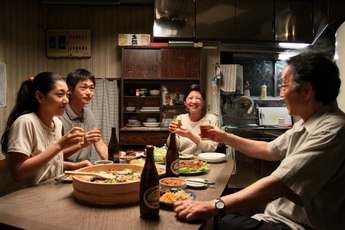 After her second documentary, Yang couldn't get her one brother's two week trip to Japan for medical treatment out of her head, so she eventually wrote a screenplay about it. This screenplay eventually became her first fiction feature, the award-winning Our Homeland, which starred Ando Sakura. Yang had a lot of trouble getting producers to commit to the project because they saw it as "trouble" and they didn't think there was much of an audience for it. She eventually gave up on the major production houses and went with one that was more independent. The reaction from her first-choice actors and actresses was "totally opposite reaction" of the producers. They all jumped at the chance. Turns out, the actresses and actors were the more prescient ones. Ando Sakura (who plays the role based on Yang's life), and Arata Iura (who plays the brother coming back to Japan from North Korea for medical treatment) both won the 2012 Blue Ribbon Best Actress and Best Supporting Actor Awards respectively, while the film itself won Best Screenplay and Best Picture. Folks told Yang that Ando wouldn't be able to get roles after appearing in Our Homeland. Again, Ando proved them wrong by snagging more roles on film and television, including more Best Actress Awards for her portrayals in the 2014 films 100 Yen Love and 0.5 mm.
After her second documentary, Yang couldn't get her one brother's two week trip to Japan for medical treatment out of her head, so she eventually wrote a screenplay about it. This screenplay eventually became her first fiction feature, the award-winning Our Homeland, which starred Ando Sakura. Yang had a lot of trouble getting producers to commit to the project because they saw it as "trouble" and they didn't think there was much of an audience for it. She eventually gave up on the major production houses and went with one that was more independent. The reaction from her first-choice actors and actresses was "totally opposite reaction" of the producers. They all jumped at the chance. Turns out, the actresses and actors were the more prescient ones. Ando Sakura (who plays the role based on Yang's life), and Arata Iura (who plays the brother coming back to Japan from North Korea for medical treatment) both won the 2012 Blue Ribbon Best Actress and Best Supporting Actor Awards respectively, while the film itself won Best Screenplay and Best Picture. Folks told Yang that Ando wouldn't be able to get roles after appearing in Our Homeland. Again, Ando proved them wrong by snagging more roles on film and television, including more Best Actress Awards for her portrayals in the 2014 films 100 Yen Love and 0.5 mm.
The quote from Shota Tsai Ogawa can be found in Ogawa's article - "A long way home: the rhetoric of family and familiarity in Yang Yong-hi's Pyongyang Trilogy" in Journal of Japanese and Korean Cinema, 2017 Vol. 9 No. 1, 30-46. http://dx.doi.org/10.1080/17564905.2017.1289296
I thank writer Kelley Dong for bringing that article to my attention.